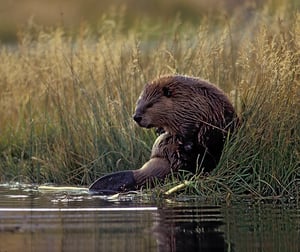 It’s a busy time on the mountain for us, but you might not expect beavers to be as active this time of year. Surprise! They are busier than you’d think right around now because between January and February, it’s mating time for our furry friends. Beavers are a monogamous species, meaning they mate with one partner for life. They start reproducing around age two or three, at which point they build a very impressive lodge with their mate and start their family.
It’s a busy time on the mountain for us, but you might not expect beavers to be as active this time of year. Surprise! They are busier than you’d think right around now because between January and February, it’s mating time for our furry friends. Beavers are a monogamous species, meaning they mate with one partner for life. They start reproducing around age two or three, at which point they build a very impressive lodge with their mate and start their family.
These diligent builders construct their homes out of logs, sticks, and mud. They build a large mound of material first, and then chew an underwater access tunnel and hollow out the den. In order to build an adequate lodge, beavers must accumulate mass amounts of wood. They also alter their environment by building dams in near-by flowing water to create wetlands that make their life easier. These wetlands provide changes in vegetation and wildlife that not only provide food for the beavers in coming years, but also allow easier travel and winter access through the ice. The beavers need the water to be deep enough so that the ice will not freeze all the way through in order to maintain access to the underwater tunnel. All of this construction requires vast amounts of labor. A single beaver can cut up down up to 1700 trees in a one year! Once the dams and lodge are complete, the beaver pair can start to build their family.
Beavers have it tough in terms of viable time in which successful mating can occur. Due to the short mating season of about 2 months, and the even shorter period of 12 hours at a time in which a female beaver is in heat, they have adopted some unique mating behaviors. Females will construct mounds comprised mainly of mud, on which they will excrete their scent to let their male counterpart know they are ready to get down to the business of beaver making. Due to the short window of time, the male beaver makes sure to stay close to his lady during mating season and to check the mounds for scent often.
After successful mating has occurred, the female will carry her young for about 107-110 days. Before birth, the female will construct a soft bed in the lodge on which she will have her young. Females give birth to one litter per year, usually with one to four offspring, called kits. Beaver birth can take anywhere from several hours to several days. When they finally arrive into the world around May, the babies’ eyes are already open and they are fully covered in fur. These eager little creatures can swim within 24 hours of birth, and will be ready to explore the outside world within a couple days. The young beavers nurse for about two to three months, and then begin eating the food that is foraged for them by their parents. Both the mother and father share the responsibility of taking care of the young.
Young beavers stay under the care of their parents until they are about two years old, at which point they are sent off into the world to find mates of their own. Once they find their ideal life partner, they will begin to build a life and family of their own. These adorable, industrious, and impressive animals can live to be about 20 years old, producing a new litter each year.
Author, Kayla Kramer, is a winter naturalist in her second season at Walking Mountains Science Center in Avon. The center is open Mondays through Saturdays from 9-5 and is free and open to the public.









